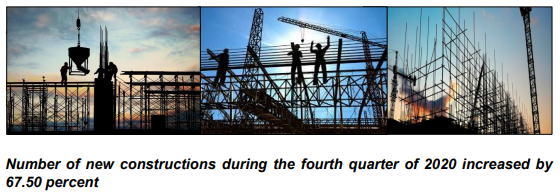
The Province of Biliran recorded a total of 67 construction projects from approved building permits during the fourth quarter of 2020. This figure is 67.50 percent higher than its reported 40 constructions during the same quarter of 2019.
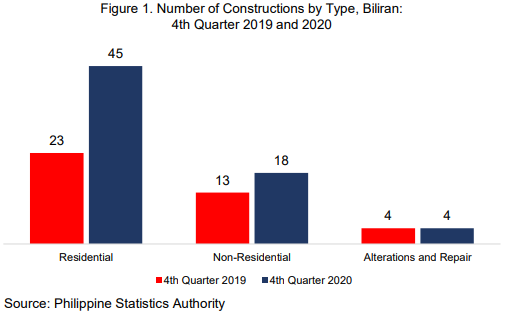
By type of construction, residential accounted for more than half or 67.16 percent of the total construction projects in the province during the fourth quarter of 2020. Non-residential buildings and alteration and repair of existing buildings shared 28.87 percent and 5.97 percent, respectively.
Number of construction projects for residential and non-residential buildings both increased by 95.65 percent and 38.46 percent, respectively. There was no reported change in the number of alteration and repair of existing buildings.
Value of building constructions during the fourth quarter of 2020 reached about P204 million
Total value of building constructions in the province during the fourth quarter of 2020 was estimated at P204 million. This figure is about 179.45 percent higher compared with the estimated value of P73 million during the same quarter of 2019.
In terms of total value, non-residential buildings recorded more than half (65.69 percent) of the total value during the fourth quarter of 2020. This was followed by residential buildings sharing 27.45 percent and the alteration and repair of existing buildings comprising 6.37 percent
Total value of residential and non-residential constructions increased by 74.46 percent and 271.88 percent while that of alteration and repair of existing buildings also increased by 169.52 percent.
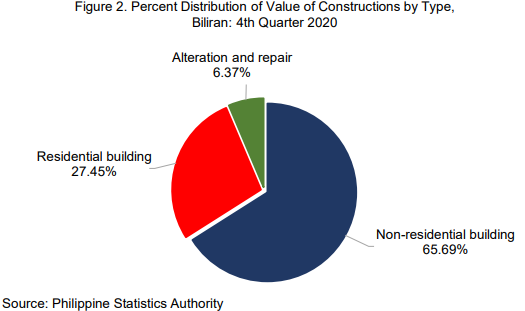
Average cost per square meter of residential constructions during the fourth quarter of 2020 is P9,660
Average cost of residential constructions during the fourth quarter of 2020 amounted to P9,660 per square meter which is 15.44 percent higher compared with the recorded average cost of P8,368 per square meter during the fourth quarter of 2019.
By type, single buildings reported an average cost of P9,750 per square meter during the fourth quarter of 2020 which is 12.43 percent higher than its average cost of P8,672 per square meter during the same quarter of 2019. Apartment/accessoria also posted higher average cost per square meter by 65.40 percent, from P5,797 per square meter to P9,588 per square meter.
Duplex/Quadruplex type of buildings had no average cost per square meter during the fourth quarter of 2020 but reported an average cost of P7,333 per square meter during the same quarter of 2019. Meanwhile, other types of residential buildings reported an average cost of P8,333 per square meter during the fourth quarter of 2020.
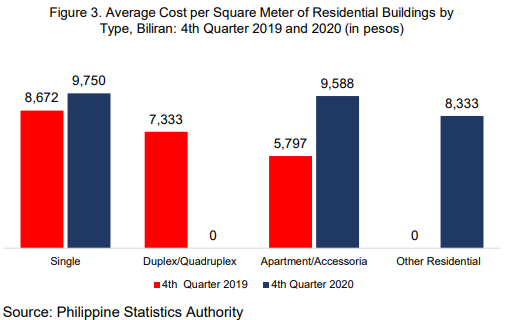
Average cost per square meter of non-residential constructions during the fourth quarter of 2020 is P9,555
During the fourth quarter of 2020, average cost of non-residential buildings amounted to P9,555 per square meter which is lower by 46.84 percent compared with the average cost of P17,973 per square meter during the same quarter of 2019.
By type, commercial buildings set the highest average cost during the fourth quarter of 2020 at P12,957 per square meter. This figure posted an increase of 32.93 percent from its average cost of P9,747 per square meter during the same quarter of 2019.
Institutional buildings came in next with an average cost of P8,457 per square meter during the fourth quarter of 2020 which is lower by 58.03 percent from its average cost of P20,149 per square meter during the fourth quarter of 2019.
Agricultural buildings reported an average cost of P7576 per square meter during the fourth quarter of 2020, posting a decline of 43.18 percent from its average cost of P13,333 per square meter during the same quarter of 2019.
Industrial buildings had no reported constructions during the fourth quarter of 2019 and 2020 hence also no reported average cost per square meter.
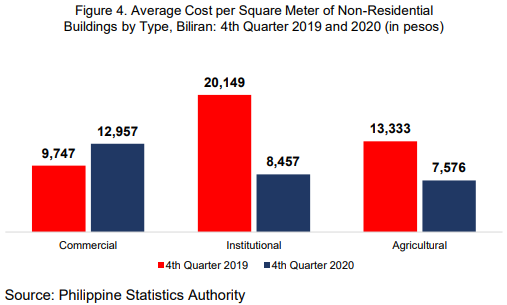
SGD. RENAVIL V. CUEVA
Chief Statistical Specialist
TECHNICAL NOTES
Definition of Terms
(Adopted from the Revised and Updated IRR of the National Building Code)
Building Permit is a written authorization granted by the LBO to an applicant allowing him to proceed with the construction of a specific project after plans, specifications and other pertinent documents have been found to be in conformity with the National Building Code (PD 1096).
Building refers to any independent, free-standing structure comprised of one or more rooms or other spaces, covered by a roof and enclosed with external walls or dividing walls which extend from the foundation to the roof.
Construction refers to all on-site work done from site preparation, excavation, foundation, assembly of all the components and installation of utilities, machineries and equipment of buildings/structures.
Residential Building is a building for which its major parts or more than half of its gross floor area is built for dwelling purposes. This type of building can be of the single type, duplex, an apartment and/or accessoria and residential condominium.
• Single House is a complete structure intended for a single family or household, i.e. bungalow, 2-storey house, nipa hut.
• Duplex is a structure intended for two households, with complete living facilities for each; it is a single structure divided into two dwelling units by a wall extending from the floor to the ceiling.
• Apartment is a structure, usually of two storey made up of independent living quarters, with independent entrances from internal walls and courts.
• Accessoria is a one or two-floor structure divided into several dwelling units, each dwelling unit having its own separate entrance from the outside. • Residential condominium is a structure, usually of several storeys, consisting of multiple dwelling units.
• Other residential construction consists of school or company staff houses, living quarters for drivers and maids and guardhouses. Non-Residential Building includes commercial, industrial, agricultural and institutional buildings.
• Commercial Building refers to office buildings and all buildings which are intended for use primarily in wholesale, retail and service trades; i.e. stores, hotels, restaurants, banks, disco houses, etc.
• Industrial Buildings are all buildings used to house the production, assembly and warehousing activities of industrial establishments; i.e. factories, plants, mills, repair shops, machine shops, printing press, storage plant, electric generating plants.
• Institutional Buildings are buildings which are primarily engaged in providing educational instructions and hospital/health care; ports, airports and other government buildings; i.e. schools, museums, libraries, sanitaria, churches, hospitals.
• Agricultural Buildings are buildings used to house livestock, plants and agricultural products such as barn, poultry house, piggeries, stables, greenhouses and grain mill.
• Other Non-Building Constructions include cemetery structures, street furniture, waiting sheds, communication towers, etc.
Addition refers to any new construction which increases the height or area of an existing building/structure.
Repair is a remedial work done on any damaged or deteriorated portion/s of a building/structure to restore its original condition.
Renovation is any physical change made on structures to increase the value, quality and to improve the aesthetic.
Alteration is a construction in a building/structure involving changes in the materials used, partitioning and location/size of openings, structural parts, existing utilities and equipment but does not increase the overall area thereof.
Conversion is the change in the use or occupancy of structure or any portion thereof, which has different requirements.
Demolitions refer to the systematic dismantling or destruction of a building/structure, in whole or in part.
Street furniture are street structures consisting of monuments, waiting sheds, benches, plant boxes, lampposts, electric poles, and telephone poles.
Floor Area of Building refers to the sum of the area of each floor of the building measured to the outer surface of the outer walls including the area of lobbies, cellars, elevator shafts and all communal spaces in multi-dwellings. Areas of balconies are excluded.
Total Value of Construction refers to the sum of the cost of building, electrical, mechanical, plumbing, and others. The value is derived from the approved building permit and represents the estimated value of the building or structure when completed.

